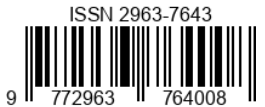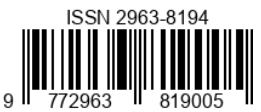Etika Pedagang Menurut Al-Qur’an Dan Sunnah: Studi Literature
DOI:
https://doi.org/10.55606/jekombis.v2i2.1571Keywords:
Al-Qur'an and Sunnah, Ethics, TradersAbstract
The journal entitled "Trader Ethics according to the Qur'an and Sunnah with the author Nahlah et al (2023" contains the profession of a trader who is in great demand by many people. And like other professions, this profession is inseparable from procedures and rules based on government law and sharia based on the Al-Quran and Hadith. This profession is also very noble in the view of Islam, including the eight groups promised by Allah SWT to get the Throne on the Day of Judgment. Besides that, there are many other advantages. Of course, it is accompanied by several conditions that must be met to get this priority, including being honest, straightforward selling, and so on. This study aims to describe ethics in trading as reported in the Al-Quran and Hadith, then synchronized with business ethics according to modern economics. The study uses SLR (Systematic Literature Review) with data sources from the Al Quran, Hadith, and several journals. The results of the study show that the rules or ethics of doing business in a modern economy are also contained in the rules or ethics of trading according to the Al Quran and Hadith. Even more complex than what is in the Al-Quran and Hadith.
Downloads
References
Aggarwal, M., & Mehta, D. (2013). CSR: A strategy for sustainable business success: Evidence from Indian companies. Social Science Research Network.
Baidowi, A. (2010). Etika Bisnis Islam Dalam Perspektif Islam. Hukum Islam, 9(1412–3851), 239–250.
Hasoloan, A. (2018). Peranan Etika Bisnis dalam Perusahaan Bisnis. Jurnal Warta, 57, 37 39. https://www.fairportlibrary.org/images/
files/renovationProject/concepcost_estimate_accepted_031914.pdf
Lusiana, & Suryani, M. (2014). Metode SLR untuk Mengidentifikasi Isu-Isu dalam Software Engineering. J. SATIN -Sains Dan Teknol. Inf, 3(1), 1–11.
Muzlifah, E. (2015). Maqashid Syariah Sebagai Paradigma Dasar Ekonomi Islam. Jurnal Ekonomi Dan Hukum Islam, 3(2), 73–93.
Qoyum, A., Sakti, M. R. P., Thaker, H. M. T., & AlHashfi, R. U. (2022). Does the islamic label indicate good environmental, social, and governance (ESG) performance? Evidence from sharia-compliant firms in Indonesia and Malaysia. Borsa Istanbul Review, 22(2), 306–320. https://doi.org/10.1016/j.bir.2021.06.001 Santoso, J. T. (2021). Apa Saja Prinsip Etika dalam Berbisnis. https://alumni.stekom.ac.id/artikel/apa-saja- prinsip-prinsip-etika-dalam-berbisnis
Srihiang, D., Nurfamiyati, & Riani, W. (2022). Penerapan Etika Bisnis Islam pada Pedagang Kaki Lima di Kecamatan Regol Kota Bandung. Bandung Conference Series: Economics Studies, 2(1),154–164. https://doi.org/10.29313/bcses.v2i1.2264 Sujatmiko, E. (2014). Kamus IPS (1st ed.). Aksara Sinergi Media.
Triandini, E., Jayanatha, S., Indrawan, A., Werla Putra, G., & Iswara, B. (2019). Metode Systematic Literature Review untuk Identifikasi Platform dan Metode Pengembangan Sistem Informasi di Indonesia. Indonesian Journal of Information Systems, 1(2), 63–77. https://doi.org/10.24002/ijis.v1i2.1916
Downloads
Published
How to Cite
Issue
Section
License
Copyright (c) 2023 Jurnal Penelitian Ekonomi Manajemen dan Bisnis

This work is licensed under a Creative Commons Attribution-ShareAlike 4.0 International License.







